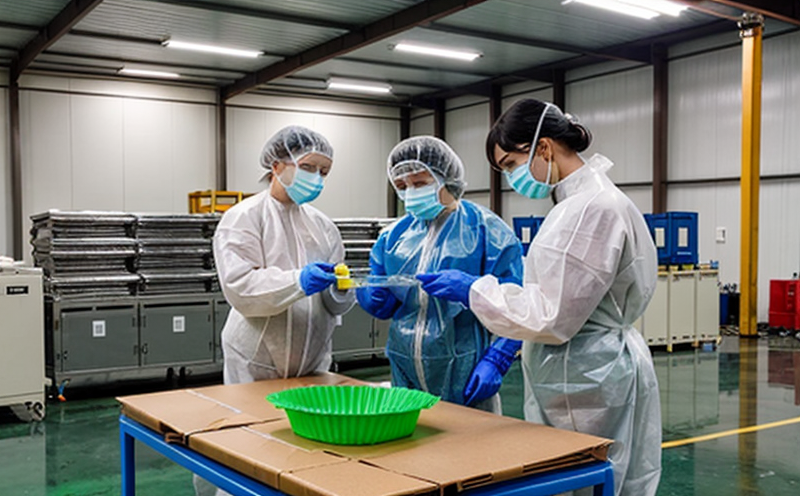ISO 1133-4 Melt Flow Rate of Blow Molded Bottles
The ISO 1133-4 test is a critical procedure for determining the melt flow rate (MFR) of thermoplastics, particularly essential in plastic packaging manufacturing. This test evaluates how easily a material flows when subjected to heat and pressure, providing insights into its processability and performance under various conditions.
For blow molded bottles, accurate MFR measurement ensures that the plastic used can withstand the high-pressure environment during bottle formation without compromising structural integrity or quality. Understanding this value helps manufacturers optimize production processes, ensuring consistent product quality and meeting regulatory standards.
The test involves heating a specified quantity of resin to a precise temperature and subjecting it to a constant load while measuring the mass discharged from the extrusion die over a given period. The results are expressed as grams per 10 minutes (g/10min), offering a quantitative measure of material flowability.
Blow molded bottles, especially those used in food and beverage packaging, must adhere to stringent safety and quality standards. Accurate MFR testing ensures that the plastic meets these requirements, contributing to product reliability and consumer safety. This test is particularly important for polyethylene (PE) and polypropylene (PP), commonly used in packaging.
Manufacturers can use this information to fine-tune their production processes, selecting the right grade of resin to achieve the desired balance between processability and strength. By leveraging ISO 1133-4 results, they can optimize cycle times, reduce waste, and enhance overall efficiency in their manufacturing operations.
The precision of this test is crucial for ensuring that the final product meets both internal quality control standards and external regulatory requirements. This is especially true in sectors like pharmaceuticals, where packaging integrity directly impacts product safety.
Understanding the nuances of ISO 1133-4 testing helps R&D engineers design more efficient processes, while compliance officers ensure that all products meet necessary regulations. For procurement teams, this knowledge aids in selecting suppliers who can provide consistent and high-quality materials.
Industry Applications
| Application Sector | Description |
|---|---|
| Beverage Packaging | Determining the MFR of PET bottles ensures they can withstand bottling pressures without deforming. |
| Pharmaceutical Packaging | Ensures that ampoules and vials meet strict quality standards, enhancing product safety. |
| Agricultural Packaging | MFR testing aids in selecting the right plastic for containers to ensure durability and leak resistance. |
Why Choose This Test
The ISO 1133-4 test is indispensable for ensuring consistent product quality in plastic packaging manufacturing. By accurately measuring the melt flow rate, manufacturers can optimize their production processes to achieve optimal material performance.
This test provides a reliable method for assessing the processability of thermoplastics used in blow molded bottles. It helps identify the right grade of resin that balances flowability with strength and durability. This balance is crucial for ensuring that packaging meets both functional requirements and regulatory standards.
The precision of ISO 1133-4 testing ensures that manufacturers can select materials that are not only cost-effective but also meet the highest quality standards. By leveraging this test, companies can enhance their reputation through consistent product performance and reliability.
Furthermore, MFR testing is essential for compliance with international regulations governing plastic packaging. It helps ensure that products comply with stringent safety and environmental requirements, thereby protecting both consumers and the environment.
In summary, ISO 1133-4 MFR testing is a cornerstone of quality assurance in plastic packaging manufacturing. Its ability to provide accurate and reliable data makes it an essential tool for ensuring consistent product quality and meeting regulatory standards.
International Acceptance and Recognition
- The ISO 1133-4 test is widely recognized in the global packaging industry as a standard method for evaluating melt flow rate.
- Absence of conflicting standards ensures consistent results across different laboratories worldwide.
- Regulatory bodies around the globe accept MFR values determined by this test, facilitating international trade and compliance.
- The standardized procedure ensures that manufacturers can compare results globally, enhancing their ability to meet international quality and safety benchmarks.





